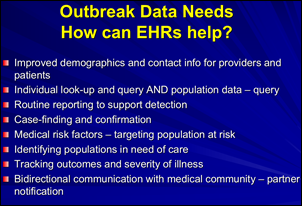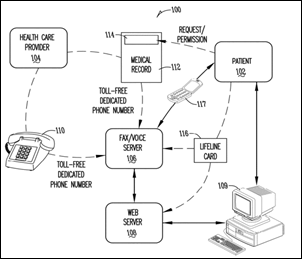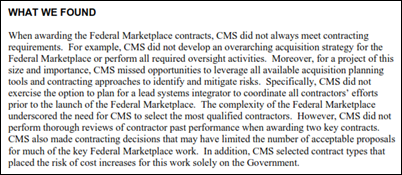I remember when the COVID lab leak theory was a "right-wing narrative"
News 1/21/15
Top News

Mayo Clinic chooses Epic, as I mentioned a few days ago from a reader’s rumor report. Cerner gets a double whammy – not only do they lose the Mayo bid, some of their systems will be displaced as they (along with GE Healthcare) are the Mayo incumbent. Actually, there’s one more Cerner insult: former Mayo CEO Denis Cortese, MD sits on Cerner’s board.
Reader Comments

From Banned in Boston: “Re: McKesson Horizon. The attached letter verifies its sunsetting on March 31, 2018. The event has passed with little fanfare since Horizon has become increasingly obsolete.” The letter, signed by McKesson EVP Pat Blake and President Jim Pesce, says the company will issue a Meaningful Use Stage 3 update and thanks Horizon users for their “partnership,” a trite, vendor-created synonym for “sending checks as a customer.”

From Jose Francisco: “Re: Scripps Health. Will be moving to Epic. Impact Advisors led the system selection – Cerner never had a real shot. Decision will become public in 30-60 days.” Unverified. Scripps chose GE Healthcare’s Centricity Enterprise in 2007 and Allscripts Enterprise for its outpatient clinics in 2009. Assuming the rumor is true, EMR critic and Scripps cardiologist and author Eric Topol, MD will become an Epic user – it will be interesting to see what he says about it among all of his smartphone infatuation. Update: I reached a non-anonymous source who says that Scripps hasn’t yet made a decision as far as he or she knows.
From Lips Pursed: “Re: HISsies voting. It’s just a popularity contest and the ballot choices are stupid.” Of course it’s a popularity contest, just like the Presidential election – what did you think it was? Readers (few of whom are stupid) make the nominations and vote for their choices as they’ve done since 2008, with the most-nominated entries appearing on the ballot. Having people who didn’t nominate anyone complain now is like moaning about the Presidential candidate chosen by your more responsible peers in that primary election voting you skipped.
HIStalk Announcements and Requests
The results of my reader survey are always interesting and useful. Thanks to those who responded.
Some nice point-counterpoint commentary was generated by CommonWell’s answers to HIStalk reader questions and a reaction article by Brian Weiss of Carebox. The comments are getting interesting as Brian suggests that (a) HIStalk readers vote as consumers on the approaches of the respective organizations, and (b) that the organizations consider developing a prototype for exchanging information securely and under the control of patients, driven only by their email address. They are also discussing patient-controlled health record banks.
Welcome to new HIStalk Platinum Sponsor Oneview Healthcare. The Dublin, Ireland-based company (with US offices in San Francisco and Pittsburgh) offers a Microsoft-powered customizable interactive patient care system that’s accessible by smartphone, tablet, or in-room TV. Patients get education, entertainment, communications services, messaging, scheduling, way-finding, meal ordering, nurse rounding, and remote consultation, while clinicians use it to access electronic medical records and other point-of-care applications. Two big reference clients are the newly built Chris O’Brien Lifehouse in Sydney, Australia (they have a patient experience focus and every patient interacts with the Oneview system) and UCSF Mission Bay (a three-hospital campus opening in a couple of weeks). Maimonides Medical Center (NY) SVP/CIO Walter Fahey says, “The capability that the Oneview solution can deliver is second to none and it will transform the healthcare experience, not only for our patients, but for our healthcare teams and hospital managers.” Thanks to Oneview Healthcare for supporting HIStalk.
I found this overview video of Oneview Healthcare on Vimeo.
Listening: Gary Lewis and the Playboys. Like most of America, I can’t understand how the unattractive, minimally talented son of the annoying Jerry Lewis could have become a 1960s pop star, at least until his career was waylaid when he was drafted and shipped off to Vietnam in 1967. I’ve seen him live a couple of times –he’s good natured (he’s 68 now) and he had some massive songwriting and production firepower behind his records. I have a strong need to hear “This Diamond Ring,” “Palisades Park,” “Everybody Loves a Clown,” “Save Your Heart for Me,” and “Little Miss Go Go “ every few years. Trivia: there were no actual Playboys on the records – it was all Gary and some studio musicians, heavily overdubbed and recorded using the opportunity created by his mom’s money and his dad’s name.
Acquisitions, Funding, Business, and Stock

Xconomy profiles nonprofit Wisconsin investor BrightStar, which funnels charitable donations of around $200,000 to complete funding rounds for early-stage companies that are creating state jobs. It quotes Forward Health Group CEO Michael Barbouche, who says working with BrightStar is painless and easy.
Patent troll MMRGlobal challenges recent court rulings in which its infringement lawsuits against Allscripts, WebMD, and others were rejected. Above is an illustration from one of its 13 patent applications from its 300 open lawsuits. MMRGlobal’s penny stock shares (literally: its shares are listed at $0.01 on the pink sheets) have dropped 59 percent of their value in the past year. Founder Bob Lorsch and his spokesperson/president wife were featured in a 2012 TV show called “Interior Therapy with Jeff Lewis” in which they are portrayed as emotional hoarders of a crammed houseful of stuff. I interviewed him a couple of year ago and found him charming and his product interesting, although the endless lawsuits overshadow all of that. He made one of his fortunes selling 976 telephone services in the 1980s, including a Santa Claus hotline (he sued a phone sex company for using a number similar to his) and running a children’s 976 phone service as a fundraiser for museums in which he kept $1.75 from each $2 call.
The Washington Post profiles hCentive, a software development company started by a guy who in 2009 downloaded a copy of the Obamacare bill the Senate was then debating and saw opportunity. The Affordable Care Act was signed into law nine months later and the three-person company now has 700 employees and $50 million in annual revenue after building four state exchanges and being signed by the federal government to build a small business site after it fired CGI for the failed Healthcare.gov rollout.
Sales

Wheaton Franciscan Healthcare (WI) chooses Epic in a $54 million, five-year project.

Southeastern Health (NC) chooses eClinicalWorks Care Coordination Medical Record.
Aetna selects HealthEdge’s rules-powered health management system for payors.
People

Randy Carpenter (Omnicare) joins Stoltenberg Consulting as SVP of strategic services.

Xerox Government Healthcare names Scott Bennett (Siemens Healthcare) as SVP of sales.
Announcements and Implementations
PeriGen announces a doubling of its customer base in 2014, with 140,000 births to date supported by its PerCALM Tracings electronic fetal monitoring system.

St. Maarten Medical Center says it will be the first hospital in the Caribbean to use a fully electronic system when it completes its implementation of CPSI, which replaces a Siemens MedSeries4 system that was “no longer reliable and nearing a system failure.”
GE Healthcare and NextGen earn EHNAC’s first practice management system accreditation.
Government and Politics

Computer scientist Kathy Pham, a new employee of the United States Digital Service, attended Tuesday night’s State of the Union address as one of 22 guests invited by the White House. She has been a healthcare informatics researcher, a software engineer for Harris Healthcare Solutions, and a healthcare consultant with IBM. She also serves as a patient advocate for her mother, who has acute lymphoblastic leukemia.
A report by HHS’s Office of Inspector General finds that CMS’s work on Healthcare.gov was sloppy, hurried, and poorly overseen, awarding no-bid contracts worth hundreds of millions of dollars without reviewing past company performance or having firm requirements defined. As has been widely reported, CMS hired 33 companies to work on the site, but didn’t name any one of them to be in charge, although they just assumed that CGI Federal was running the project. The agreements also didn’t cap payments and allowed overbilling with minimal documentation, so some companies were paid up to three times their bid amount. CMS originally estimated the value of six key contracts at $464 million, but has paid $824 million so far.
Privacy and Security
A security company finds that Healthcare.gov connects in the background to dozens of private websites, including Facebook, Google, and Twitter, raising concerns about cybersecurity exposure and whether user information is really private.
Innovation and Research

A new research article describes how Kaiser Permanente analyzed its EHR information to identify neighborhoods with a low rate of childhood vaccinations, allowing it to mount outreach efforts to five areas. One private school had a 50 percent rate of “personal belief exemption.”
Technology
in England, the medical director of NHS says wearables will play a vital part in future health in allowing people to be monitored at home for irregularities in heart rhythm, breathing, and edema. He adds that NHS will push a “huge rollout” of those technologies.

Bizarre: Airbnb-inspired Airpnp lets app users in need of a bio break rent bathrooms in private homes. The founders were inspired by a New Orleans decision to ban street-located Porta-Potties during Mardi Gras. It’s hard to fathom that sellers would allow a stranger into their homes (and bathrooms) for a dollar or two. It sounds like a spoof to me, but then again it’s sometimes hard to tell if a startup is serious. Perhaps the same skepticism applied early on to Uber, however, which just announced that its San Francisco revenue alone is $500 million per year – nearly four times the entire taxi market there — and is growing 200 percent per year.
Microsoft patents user-configurable technology that can automatically dim and silence a smartphone when the phone’s GPS detects that the user has entered a theater, when it senses darkness and quiet, or when so instructed by the Wi-Fi system being used.
Other

An epidemiologist with New York City Department of Health and Mental Hygiene tells the Health IT Policy Committee that fast outbreak identification and control requires better integration between EHRs and its disease surveillance system. She envisions EHRs sending real-time data for surveillance and then receiving back prompts for additional information, such as patient demographics.
A North Carolina OB-GYN says doctors should use computers and not vice-versa, urging his peers to look at the patient instead of the screen. “The folks who sold us these systems talked about all the wonderful things EMR can do … One might assume the EMR would excise the tumor, lower the blood glucose and stop the hallucinations. The problem is that the EMR really should not ‘do’ anything. Patients tell us their concerns. Practitioners do their best to listen and perform the appropriate evaluation, with or without technology … everything we need to know about our patients is in their face, in their voice, and in their eyes.”
Forbes India profiles India-based Narayana Health, whose first non-India hospital opened in the Cayman Islands a year ago in a partnership with Ascension Health. Founder and cardiac surgeon Devi Shetty got the idea for his medical tourism hospital from a friend who mused, “The most profitable hospital in the world is the one which is built on a ship and parked outside US waters because it gets to serve American patients and yet stays away from its jurisdiction.” The hospital has implanted an artificial heart for what Shetty says is less than half of the $1.2 million US hospital price. He’s working with two US-based health systems on new hospital software (I’d be curious to learn more about that) and is talking about starting a Caymans medical school.
Weird News Andy likes the glucose-monitoring temporary tattoo on the left better than the diabetes-hating one on the right, although I’ll add that both might illustrate diabetic monitoring assuming there’s a Diastix right above the word “diabetes.”
Sponsor Updates
- Zynx Health VP Guillermo Ramas writes about attaining the impossible in the company’s latest blog.
- Frank Myeroff of Direct Consulting Associates interviews Denver Health CIO Jeff Pelot.
- Huron Consulting Group will exhibit at the AHLA 2015 Legal Issues Affecting Academic Medical Centers and Other Teaching Institutions conference in Washington, DC from January 22-23.
- Voalte Product Manager Anthony Mitchell blogs about the smart use of smartphones in the latest company post.
- ExitEvent highlights Validic and its relationship with digital health startup Qardio.
- T-System Clinical Systems Engineer Deon Melton, RN shares “Life Lessons Learned in the ER” in a new blog.
- Caradigm Director of Product Marketing Scott McLeod pens a new blog, “All Signs Point to Population Health Management.”
- AtHoc President and CEO Guy Miasnik writes about the role AtHoc technology played in protecting Gritman Medical Center from an active shooter.
- The local business paper highlights the venture capital funding raised by CareSync in Q4 2014.
- CareTech will attend the January 28 MCACHE event on “Building a Leadership Team for the Healthcare Organization of the Future.”
- AirWatch’s Noah Wasmer offers five end-user computing technology predictions for 2015 in a new blog.
- ADP AdvancedMD offers tips on leveraging practice data to view key performance indicators in a new blog.
- Besler Consulting offers advice on how to increase Medicare EHR incentive payments.
- Aventura will exhibit at the IMN Health Impact Conference of the Southeast in Tampa on January 23.
- CitiusTech achieves the ISO 13485 quality management system standard for medical devices.
- CoverMyMeds shares a moment with Account Coordinator Josh Campanella in the latest installment of its “Hey, You!” blog series.
- ABCNews.com lists Clockwise.md amongst other companies making a name for themselves developing online booking software.
- CommVault launches new endpoint data protection to secure, support, and back up mobile enterprises.
- Craneware lists its goals for 2015 in a new blog post.
Contacts
Mr. H, Lorre, Jennifer, Dr. Jayne, Dr. Gregg, Lt. Dan.
More news: HIStalk Practice, HIStalk Connect.
Get HIStalk updates.
Contact us online.









Re: Scripps. Vendor demos are in February, how could they possibly have made a decision?
MMR was one of those PHR companies I did an assessment of back in 2007 for Chilmark’s first market trends report. Back then I found them highly suspect and gave them fairly low ratings as all they really did was provide a fax service. That is about as far as they ever got with their tech – all a bit of a sham so was not at all surprised to see them turn their sham tactics towards becoming a patent troll.
Needless to say, was delighted to see that a judge also saw through MMR’s shenanigans and threw them out on the street. Hopefully they’ll go away quietly, though not likely.
As to Mayo, yes it is a marketing blow to them but don’t see it quite as horrendous as you portray it to be.
Impact Advisors “advises” a client to pick Epic? Shocking. Next up, a multi-million dollar contract for IA for implementation.
What is now happening in the search and selection process if lead by consulting firms with large Epic practices to keep busy, get who wins the deal! It’s not going to be Cerner or Meditech. This happened before with the big 4. The C Suite needs to wake up and tell their consulting partners that if they help with the selection they don’t do the implementation, or it is a conflict of interest. It’s a known fact that over 70% of IA revenue comes from Epic and Deloitte is probably close to 40% in the HC space.
So the winner is the best solution or the consultant best solution. Only time will tell.
Hmm, If I was a C?O i would probably look at rankings like KLAS or somethings which would lead me to almost always pick Epic. I don’t care what a consulting company says if you look at the numbers and your spending big $$ on a system might as well buy the best rated one. I know that’s how i buy just about everything in my life is by what is rated the best and has the best customer service… and in both cases that would be Epic. props to Mayo on making the smarter choice.
Another big headline: this EFF report on some insecurity with healthcare.gov – https://www.eff.org/deeplinks/2015/01/healthcare.gov-sends-personal-data
Some of the article is speculation – we don’t know what exactly the data is being used for – but any way you slice it it’s worth discussion, I think.